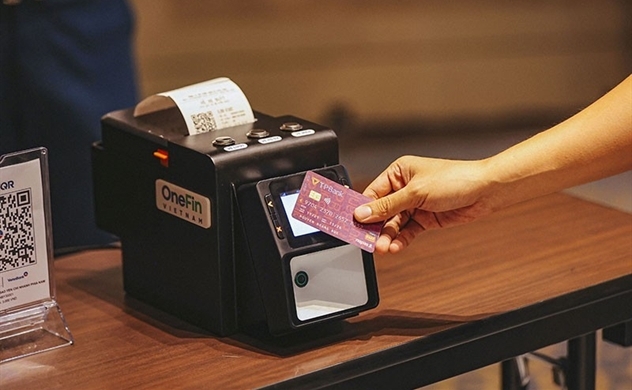
Vietnam is accelerating the adoption of cashless payment and refining the legal regulations for this activity. Photo by NDO.
Cashless payment on the rise in Vietnam
in terms of both number and value. In the first five months of 2023, cashless payment rose 52.35%, with online payment up 75.54% in number and 1.77% in value, mobile payment up 64.26% in number and 7.65% in value, QR code payment up 151.14% in number and 30.41% in value, and POS payment up 30.35% and 27.27% in value. Whereas transactions via ATMs fell 4.62% in number and 6.43% in value, suggesting a shift to electronic payment.
As of the end of 2022, 22 card issuers have deployed issuing their cards using a procedure known as “electronic Know Your Customer” (eKYC), which verifies a customer’s identity electronically. The number of cards issued with eKYC has reached 10.8 million, with 89.1 million transactions valued at 106.1 trillion VND (4.5 billion USD). About 40 banks also allowed account registration with eKYC, with more than 11.9 million active accounts now.
Kelvin Utomo, Head of Product and Solutions at Visa Vietnam and Laos shared that “Digital payment, and specifically contactless payment, is a trend that has already become entrenched in much of Asia and is growing rapidly in Vietnam. We have seen a surge of card acceptance points, including terminals, points-of-sale, contactless and QR codes, while payment volume has grown by more than half over the last year.”
According to the Head of the SBV’s Department of Payment, the legal frameworks, mechanisms and policies for cashless payment and digital transformation are constantly reviewed and modified to facilitate the development of cashless payment and ensure the security of payment activities.
The technological infrastructure for cashless payment is also upgraded and developed to ensure stable, seamless and secure operation. Vietnam’s retail payment system also reached a new milestone last year by connecting with Thailand, allowing people of the two countries to conveniently scan QR codes to pay for goods and services in the other country.
Nguồn Nhân Dân

 English
English



_241415258.png)



_21258127.png?w=158&h=98)
_81523335.png?w=158&h=98)
_61041843.png?w=158&h=98)




